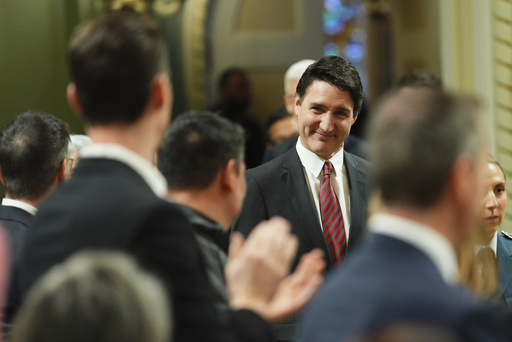
TORONTO — The prospects for Canadian Prime Minister Justin Trudeau to maintain his leadership have dimmed significantly following an announcement from the opposition party that had previously supported his government. This opposition party has declared its intention to vote against the government once Parliament reconvenes.
In light of recent challenges, Trudeau undertook a Cabinet reshuffle on Friday, though uncertainty looms regarding whether he will resign in the near future. He attended a ceremony for the swearing-in of his new Cabinet members and is scheduled to lead a meeting with them later in the day. However, he is not anticipated to make any public statements as he contemplates his next steps.
Rachel Bendayan, the minister responsible for official languages, mentioned, “He indicated to us that he faces a difficult decision at this moment.” The pressure on Trudeau is increasing, particularly following the sudden resignation of his finance minister earlier in the week, a shift that may hinder his ability to recover politically.
With Parliament now in recess for the holidays until late next month, a vote of no confidence could be put on the agenda shortly after their return. Trudeau’s Liberal Party does not hold a majority, thus relying on support from the left-wing New Democratic Party (NDP) for legislative success and to remain in power. However, that support has dissipated as NDP leader Jagmeet Singh has urged Trudeau to step down. Singh reiterated on Friday that the NDP plans to move forward with a vote intended to dismantle the government.
“No matter who is at the helm of the Liberal Party, this government’s time has come to an end. We intend to present a clear non-confidence motion during the next session of the House of Commons,” Singh expressed in a letter made public just prior to Trudeau’s Cabinet changes.
Should Trudeau opt against running in the upcoming election next year, the Liberal Party could potentially postpone Parliament’s return to enable a leadership contest to take place. New Finance Minister Dominic LeBlanc confirmed Thursday that Trudeau enjoys “the full backing of his Cabinet” but acknowledged a notable increase in calls from Liberal MPs for him to resign. He mentioned that Trudeau has indicated he is currently in a reflective phase.
Rob Oliphant, a parliamentarian from Trudeau’s party, recently became another voice advocating for his leader to step back. He suggested that there should be “a vigorous, transparent leadership contest,” adding that Trudeau has turned into a significant barrier for many progressive voters.
Trudeau’s recent adjustments to his Cabinet included the appointment of new ministers, especially in light of those departing from his government. Some ministers now find themselves in dual roles as a result of abrupt changes in leadership.
“We recognize that there will be limited time to adjust. I am fully aware of that situation,” acknowledged Nathaniel Erskine-Smith, Canada’s newly appointed housing minister. Political science expert Daniel Béland from McGill University described the reshuffle as essential due to the recent departures within the Cabinet. He warned, however, that it could be perceived merely as “shifting chairs on the Titanic.”
After nearly ten years at the helm, Trudeau’s popularity has waned significantly, primarily due to concerns over the economy, inflation, and rising living costs.
This political turmoil unfolds during a precarious period for Canada. Incoming President Donald Trump has indicated his plans to impose a 25% tariff on all Canadian exports unless the government addresses what he claims is a migration and drug crisis from Canada, despite the fact that the volume of such crossings is significantly lower when compared to the Mexico-U.S. border.
Anita Anand, Canada’s Transport Minister, who on Friday expanded her role to include the minister of internal trade, stated the importance of government cohesion when facing Trump’s aggressive stance. “I have discussed this matter with the prime minister multiple times. I believe that unity is essential at this critical moment,” she remarked.
For the time being, there is no immediate mechanism within the Liberal Party to force Trudeau out of his position. He could announce his intention to retire once a new leader has been appointed, or the party might face a no-confidence vote in Parliament, prompting an election that would likely benefit the Conservative Party.
The situation escalated on Monday when Chrystia Freeland, Trudeau’s finance minister and deputy prime minister, stepped down from her Cabinet role, expressing dissatisfaction with Trudeau’s economic management, especially in light of the steep tariffs threatened by President Trump. Adding to the turmoil, the housing minister also quit just before Freeland made her departure known.
